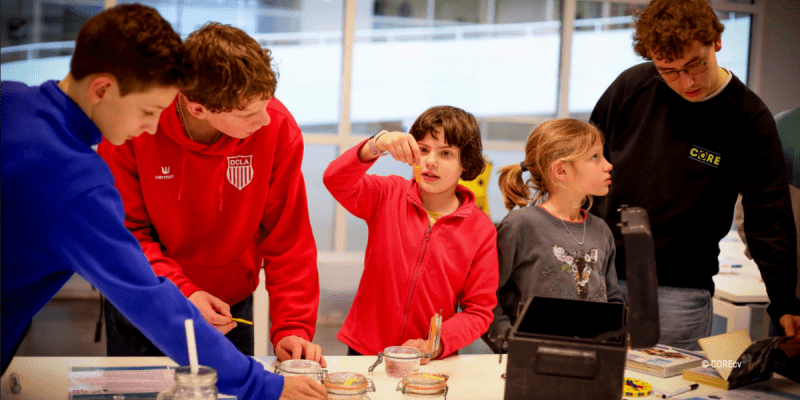
Las cooperativas mejoran el acceso a la educación, puesto que prestan servicio a las poblaciones más desatendidas y movilizan recursos en sectores que no disponen de acceso a los sistemas públicos. Además, fomentan el empoderamiento de la juventud y el desarrollo del liderazgo, ya que ofrecen a los jóvenes una plataforma en la que organizarse, adquirir capacidades empresariales y participar en la toma de decisiones.
En Beni Mellal (Marruecos), la cooperativa Yasmine Annajah no solo funciona como cooperativa, sino también como escuela. La cooperativa, creada en 2018, cuenta actualmente con 220 alumnos y alumnas y un equipo docente formado por 13 personas, así como personal de apoyo, para proporcionar educación de calidad a niños de entornos desfavorecidos. La cooperativa también financia becas escolares, refuerza las competencias lingüísticas y digitales y organiza actividades extraescolares como excursiones para reforzar los aprendizajes científicos. La cooperativa Yasmine Annajah demuestra que las cooperativas pueden gestionar directamente centros escolares y se presenta como un modelo comunitario replicable que fomenta las metas del ODS 4.
En Malasia, la Angkatan Kerjasama Kebangsaan Malaysia Berhad (ANGKASA) el organismo federativo que representa a las cooperativas del país, ha colaborado con el Ministerio de Educación para organizar los premios a la excelencia de las cooperativas escolares (SCEA, por sus siglas en inglés), a través de los cuales se destaca cómo las cooperativas escolares fomentan el emprendimiento y la participación democrática. Desde su creación en 1968, se han fundado más de 2000 cooperativas escolares, que cuentan con 1,6 millones de miembros y prestan servicio a través de distintos medios, ya sea tiendas o imprentas, en el ámbito del turismo o de la agricultura; y algunas de ellas generan volúmenes de negocios superiores a un millón de ringgit malayos anuales. Estas cooperativas, abiertas a estudiantes, profesorado y personal, practican la gobernanza democrática mediante reuniones y elecciones anuales y proporcionan programas de formación. Las cooperativas escolares refuerzan el capital humano y la economía local, puesto que impulsan la innovación, contribuyen al bienestar de la comunidad y fomentan el espíritu emprendedor entre la juventud.
En Paraguay también se puede encontrar una alianza interesante en este ámbito; la Federación de Cooperativas del Paraguay (FECOPAR), una federación de cooperativas de ahorro y crédito que se ha asociado con el Ministerio de Educación y Ciencias del país para integrar la formación cooperativa en los planes de estudio oficiales. FECOPAR proporciona a los estudiantes de entre 16 y 18 años conocimientos sobre el ámbito cooperativo y capacidades prácticas a través de programas educativos certificados, un bachillerato técnico centrado en las cooperativas y distintas iniciativas de investigación. Además, FECOPAR organiza talleres de educación financiera con las universidades y cuenta con un Comité de Juventud en el que se forman jóvenes líderes cooperativos. Estos programas refuerzan el papel de las cooperativas en el sistema educativo nacional y preparan a los y las jóvenes para ser tanto ciudadanos activos como miembros cooperativos.
En Europa, REScoop.eu, la federación europea de cooperativas energéticas, representa a una red de más de 2500 cooperativas y 2 millones de ciudadanos y ciudadanas y los sitúa en el centro de la transición energética. La educación es un punto fundamental de su misión y sus miembros aplican los principios cooperativos para concienciar a la población y desarrollar habilidades orientadas hacia la sostenibilidad. Por ejemplo, en Lovaina (Bélgica), la cooperativa de estudiantes CORE ha desarrollado proyectos de ingeniería sobre economía circular y uso responsable de la energía y ha involucrado a las comunidades a través de talleres interactivos como un escape room sobre la energía. Repowering London, en el Reino Unido, orienta la trayectoria laboral de los jóvenes al ámbito de la energía limpia. Hasta la fecha, ha dotado a más de 150 jóvenes con capacidades prácticas. Además, también organiza talleres para ayudar a los hogares a entender sus derechos energéticos y a gestionar su consumo. A través de iniciativas como esta, las cooperativas miembros de REScoop.eu demuestran que las cooperativas energéticas combinan innovación, educación y empoderamiento de los jóvenes para fomentar el aprendizaje inclusivo y sostenible.
Para más información, consultar el documento de la ACI sobre el ODS 4 aquí: https://www.copac.coop/wp-content/uploads/2025/10/4-ENG-quality-education-1.pdf




